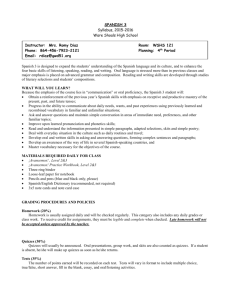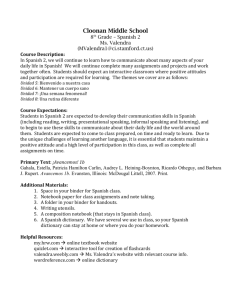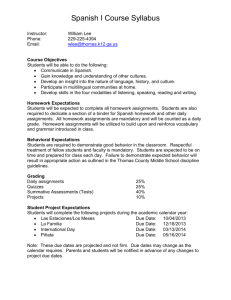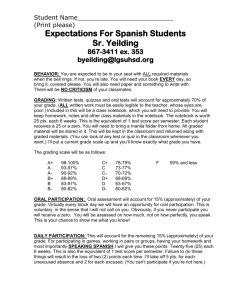2014-2015 - Centennial Independent School District #12
advertisement
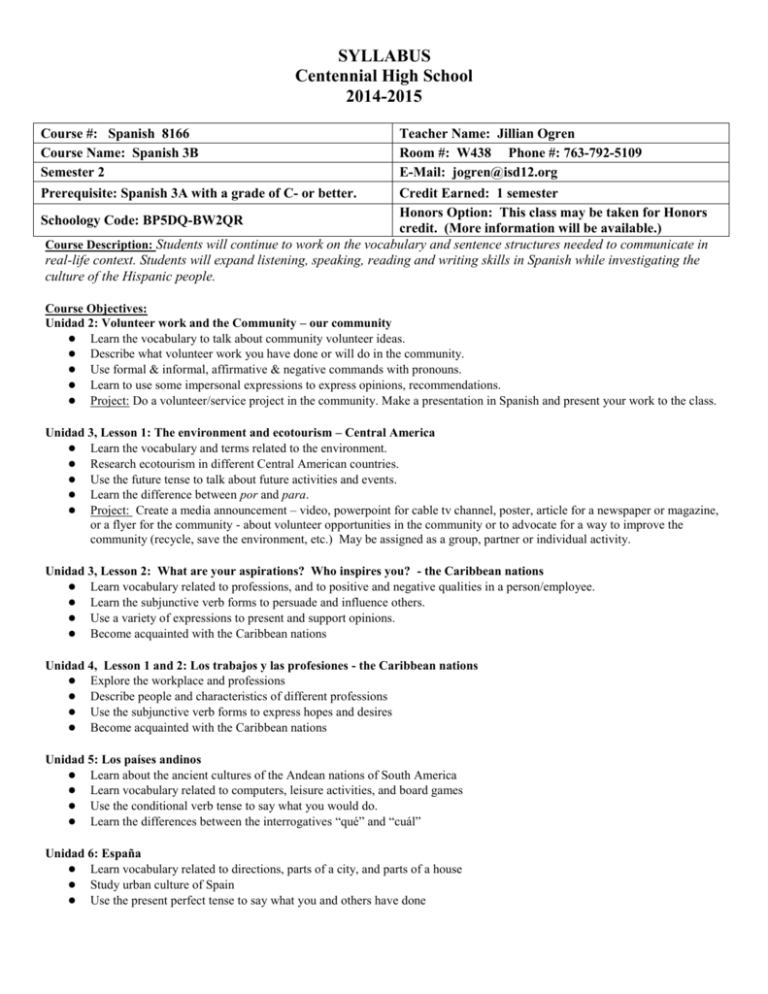
SYLLABUS Centennial High School 2014-2015 Course #: Spanish 8166 Course Name: Spanish 3B Semester 2 Prerequisite: Spanish 3A with a grade of C- or better. Teacher Name: Jillian Ogren Room #: W438 Phone #: 763-792-5109 E-Mail: jogren@isd12.org Credit Earned: 1 semester Honors Option: This class may be taken for Honors Schoology Code: BP5DQ-BW2QR credit. (More information will be available.) Course Description: Students will continue to work on the vocabulary and sentence structures needed to communicate in real-life context. Students will expand listening, speaking, reading and writing skills in Spanish while investigating the culture of the Hispanic people. Course Objectives: Unidad 2: Volunteer work and the Community – our community ● Learn the vocabulary to talk about community volunteer ideas. ● Describe what volunteer work you have done or will do in the community. ● Use formal & informal, affirmative & negative commands with pronouns. ● Learn to use some impersonal expressions to express opinions, recommendations. ● Project: Do a volunteer/service project in the community. Make a presentation in Spanish and present your work to the class. Unidad 3, Lesson 1: The environment and ecotourism – Central America ● Learn the vocabulary and terms related to the environment. ● Research ecotourism in different Central American countries. ● Use the future tense to talk about future activities and events. ● Learn the difference between por and para. ● Project: Create a media announcement – video, powerpoint for cable tv channel, poster, article for a newspaper or magazine, or a flyer for the community - about volunteer opportunities in the community or to advocate for a way to improve the community (recycle, save the environment, etc.) May be assigned as a group, partner or individual activity. Unidad 3, Lesson 2: What are your aspirations? Who inspires you? - the Caribbean nations ● Learn vocabulary related to professions, and to positive and negative qualities in a person/employee. ● Learn the subjunctive verb forms to persuade and influence others. ● Use a variety of expressions to present and support opinions. ● Become acquainted with the Caribbean nations Unidad 4, Lesson 1 and 2: Los trabajos y las profesiones - the Caribbean nations ● Explore the workplace and professions ● Describe people and characteristics of different professions ● Use the subjunctive verb forms to express hopes and desires ● Become acquainted with the Caribbean nations Unidad 5: Los países andinos ● Learn about the ancient cultures of the Andean nations of South America ● Learn vocabulary related to computers, leisure activities, and board games ● Use the conditional verb tense to say what you would do. ● Learn the differences between the interrogatives “qué” and “cuál” Unidad 6: España ● Learn vocabulary related to directions, parts of a city, and parts of a house ● Study urban culture of Spain ● Use the present perfect tense to say what you and others have done Course Expectations and Grading: Learning a language requires active participation!! Participation Grade = 10 points per week (approximately 20% of grade) ● ● ● ● ● ● ● You are evaluated on your oral participation in Spanish to encourage you to the use the language and help you build fluency. You gain points for speaking Spanish, answering the question of the day, and participating in class. You lose points for disrupting class, for acting disrespectfully, for not participating in classroom activities and for being tardy. Any points that are lost due to poor behavior or tardies will be automatically deducted from your weekly total and may not be made up. You must average 2 points per day to get an “A” for participation. If you have many excused absences, you may arrange to make up participation points by speaking with me in Spanish before or after school. Occasionally, you may fill out self-evaluations about your speaking and participation in Spanish, which will also be included in your participation grade. Daily Work/Homework (approximately 30% of grade) ● Most homework assignments will be checked at the beginning of class on the due date for a stamp. o For most daily homework assignments, you will receive a stamp (worth 2 points) on your homework calendar if your assignment is complete. If your assignment is partially complete, you may receive a different stamp (worth 1 point). Homework calendars will be collected every two weeks, so keep them in a safe place. o Unexcused LATE daily homework assignments are NOT ACCEPTED. If you don’t have it completed when it is due, you will NOT receive ANY credit for the assignment. ● Graded assignments will be deducted 10% each day that they are late, up to a 50% grade deduction. Quizzes, Tests and Projects (approximately 50% of grade) ● There will usually be a test at the end of each chapter and one or more quizzes throughout the chapter. ● Make up of tests and quizzes must be done within one week of the excused absence. Advisory is a great time to make up work! You may also make an appointment with me for before or after school. ● You are allowed to re-take ONE test or quiz if you get a D or fail it, but you must do so within one week. ● There will usually be one project per unit. ● Late projects will be deducted 10% for each day that they are late, up to a 50% deduction. Extra-Credit ● There will be many opportunities to earn extra credit. Extra credit can raise your grade by up to 2%. Attendance - We will follow the school policy. (See pages 10-11 in the handbook.) ● 3 unexcused tardies = one unexcused absence. 2 or more unexcused absences result in an automatic grade reduction. You will automatically lose one participation point for the week for each unexcused tardy. ● You have one week to make up tests, quizzes, listening and speaking activities. You can come in before or after school, or during Advisory. If you are absent: ● Make up work for excused absences must be completed within 2 school days of the absence. ● It is your responsibility to get the assignments and notes from when you were absent. Your partner will have collected handouts for you. You will find them in the folder that corresponds to your hour. ● If you have any questions, first ask your partner; if he/she cannot answer your questions, then ask the teacher. ● Also, please see the homework calendar to see if there was a homework stamp for the day you were gone. It is your responsibility to write down the assignment that you missed and show it to the teacher, with your calendar, to receive credit (a stamp). Behavior: 1. Be respectful of other students, the teacher, yourself, and the classroom. Disrespectful language will not be tolerated. 2. Speak with permission and listen when others are talking. 3. Bring all necessary materials to class: a folder for Spanish only, a notebook and a writing utensil. 4. Follow directions the first time given. 5. Keep hands, feet, objects, etc. to youself. 6. To leave the classroom (for the bathroom, office, drink) please ask the teacher in Spanish and use one of your six passes. Sign out any time you leave class and sign in when you return. Unused bathroom passes will be worth extra credit each at the end of the semester. 7. Do your own work. NO COPYING, USING ONLINE TRANSLATORS OR CHEATING!! (This includes copying homework assignments if you were gone.) You will receive a ZERO and your parents may be contacted! 8. Electronic devices must be out of sight and turned off during class (bell to bell) unless special permission has been given by the teacher to have them out.* Consequences for misbehavior: 1. Warnings: If you disrupt class, are not following along, participating, etc. you will get one warning. 2. If the problem happens a second time, 3 participation points will automatically be deducted from your weekly participation grade. 3. If the problem occurs a third time, your parents will be contacted and you will lose a total of 6 points from your weekly participation grade. You may also receive a referral to the office. 4. Immediate removal from the classroom. Referral sent to the office / re-entry process. *Consequences for misuse of electronic devices: ● ● ● ● Electronic devices are to be used for educational purposes only. If your electronic device sounds off, if you are using it for purposes that are not related to Spanish class, or if you are texting/on your phone during class it will be taken away until the end of the class period. If it happens again, your electronic device will be confiscated until the end of the day. Your parents/guardians will be notified. If it happens a third time, your electronic device will be turned into the office and your parents/guardians will need to come retrieve it. Materials Needed: ● Various worksheets and handouts (Keep the ones that are 3-hole punched for the rest of the year.) ● A folder, a notebook and a writing utensil ● Schoology - Join the course and look at it for required/supplementary materials. Textbooks: We will be using a classroom set of texts. The textbook should not be removed from the classroom. Miscellaneous: If food, beverages and/or gum become a distraction/problem, they will no longer be allowed. *Only liquids in plastic bottles are allowed in class. You need at least a C- to continue on to the next level of Spanish! GRADING A = 100 – 93 A- = 92 – 90 B+ = 89 – 87 B = 86 – 83 B- = 82 – 80 C+ = 79 – 77 C = 76 – 73 (Exemplary work – 90%-100% mastery of subject goals) (Proficient/thorough work – 80%-89% mastery of subject goals) (Acceptable work – 70%-79% mastery of subject goals) C- = 72 – 70 D+ = 69 – 67 D = 66 – 63 (Mediocre work – 60%-69% mastery of subject goals) D- = 62 – 60 NC = 59 – 0 (Unacceptable work – less than 50% mastery of subject goals) NCA = (Grade Reduced due to Attendance) NC$ = (Book missing or Fees due) Avancemos – Spanish at home! Now you can access your textbook at home, as well as do practice activities! Go to www.classzone.com. Click on ‘world language high school text’ and ‘Minnesota’. Click on your book Avancemos 2 or Avancemos 3 (Depending on which book we are working from.) You will see choices. Under each choice, you first pick a unit and lesson. *ON-LINE TEXTBOOK– You are able to see any page in your textbook, as well as hear and see any of the audio or video segments. After clicking on Avancemos 2 or 3, go to 2007 Online Book. Press Continue. Sign in as student@isd12.org. The password is centennial. *@HomeTutor is where you will spend most of your time. ● Type in your name (Spanish first name and real last name) and select a level. Level A is the easiest and Level C is the most challenging. You will be able to change the level at any time. ● Next choose the Unidad and Lección you want. Remember, this first unit is called Lección Preliminar. ● Then choose between various categories of activities. o Under Vocabulario, you can see the presentation video and do activities with it. o Interactive flashcards allow you to practice Spanish vocabulary, as well as hear the Spanish pronunciation. You can shuffle the cards and remove (temporarily) the cards you already know. o Práctica lets you practice the vocab in sentence or puzzle format. o With Telehistoria, you can view the video segments and do a variety of activities with them. o Under Gramática, you will see a list of activities to practice the grammar concepts in the chapter. Choose the level of activity and check your answers when you’re done. o Lectura allows you to practice reading assignments. With Escuchar, you can work on your listening skills. At the end of lección 2 and before the final test, you can use the Repaso inclusivo to review the entire unit. ● You can also see verb charts and glossaries (dictionaries) at any time. *Conjuguemos: Allows you to practice verb conjugation. Click on the unit you want and then scroll down to the select your choices on the bottom of the page: verb tenses, verbs, pronouns and length of time. Then click ‘start’ and try to type as many verbs as you can. You will get a score at the end. You can print out that page to report your session. Online review. For students who have trouble accessing @HomeTutor. Features the interactive flashcards and self check quizzes to allow you to practice what you’ve learned. Animated grammar: Pablo, Pili, and the twins, Toño and Toña, explain grammar concepts in a humorous manner. You can also see a more serious explanation of the grammar, plus its connection to English grammar. Audio: Allows you to download and listen to any of the scripts in the text. Culture: Cultura interactiva: Allows you to expand on the cultural information taught in the book with additional audio and video materials.

